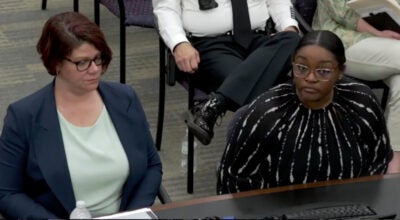NAACP protesters court cases delayed
Published 12:00 am Monday, June 24, 2013
RALEIGH (AP) — Court cases have been delayed for the first round of protesters arrested in NAACP-led demonstrations at the North Carolina Legislature.
Fifteen of the protesters appeared in Wake County District Court in Raleigh on Monday, including North Carolina chapter President William Barber. Two others scheduled to appear, including Duke University professor and author Timothy Tyson, were not in court.
NAACP legal adviser Irv Joyner, who is representing the protesters, asked District Court Judge Dan Nagle to dismiss the charges. Joyner said he believes Constitutional guarantees of freedom to assemble and address their legislators makes it unlawful to charge peaceful demonstrators with trespassing and other crimes.
Nagle told Joyner those sorts of arguments could be considered at a later time, after prosecutors had gathered evidence and lined up witnesses. The judge then continued the cases, scheduling the protesters for court appearances in late September.
Nagle didn’t ask the defendants to enter pleas Monday, but Joyner had said previously all will plead not guilty.
“They were arrested not for what they did, but because they were protesting actions that we deem to be improper, spiteful and mean-spirited,” Joyner said after the hearing. “We expect these cases to go to trial, no matter how long it takes, because there are some fundamental Constitutional questions that have to be addressed.”
They were the first court appearances for about 450 protesters arrested in seven weeks of demonstrations against the conservative policies of the Republican majorities in the General Assembly. All face similar misdemeanor counts of second-degree trespassing, failure to disperse on command and violating building rules.
The civil rights group plans to hold its latest rally late Monday afternoon.
Wake County District Attorney Colon Willoughby, a Democrat, said last week that he hasn’t decided what to do with protesters from what the NAACP calls “Moral Mondays.” He said his office has not yet received video footage of the protests and other evidence from police.
Michael Gerhardt, an expert in Constitutional law at the University of North Carolina, said the laws under which the protesters are charged aren’t unconstitutional as written, so Joyner will have to try to show that they have been applied differently depending on the political views of groups asserting their rights.
Protesters showing up in growing numbers are angry about the rightward tilt of the state since Republicans gained control of the state legislature and the governor’s mansion — the first time they’ve held both branches of government at the same time since 1870.
At rallies before entering the General Assembly to face arrest they rail against decisions to forego Medicaid expansion under the federal health care overhaul, cut unemployment benefits, pursue tax cuts that mostly benefit the wealthy and other policies.
Gov. Pat McCrory and other Republicans have dismissed the protests and vowed to hold firmly to their agenda.



